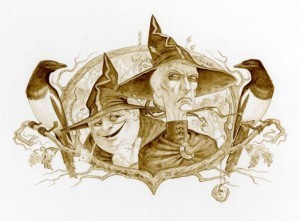Tansy Rayner Roberts's Blog, page 139
July 14, 2011
Clarion Write-a-thon Weeks 3 & 4
I forgot to do my summary post last week, probably because I was so busy writing! I wrote over 7000 words, which was like a sun coming out from behind a cloud. I am so in love with my novel right now, and the trick is to write as fast as I possibly can while I'm in this mode – lay down the words while I'm feeling the love!
This week I made it over 6000 words. Even then, knowing how well I had done the last fortnight, when it came to forming the above word meter (removing the 20K I started with before the Write-a-thon began) I stared at the maths blankly, not quite able to accept that I was nearly a week ahead of my goal.
Because, hell yes, that's the key to this kind of challenge. Define your terms, and make the goals achievable. I find that it's important to give myself a minimum daily word count, and not to allow any extra words to count the next day. In other words, just because I've actually written 1250 words a day for the first 4 days, doesn't mean I get the fifth day off. The only exception I have made for this is when I absolutely know my Sunday (the first day of my working week under this system) is going to be packed, in which case I have written a 'fake Sunday' worth of words the Saturday before. I have to do that this weekend, too.
The benefit of not allowing those extra little words to count towards future word count – by saying my goal is 1000 x 5 a week x 6 weeks as well as 30,000 words – is that those little scrappy extra bits add up, and before you know it, I'm ahead of the game. In 4 short weeks, I am 5/6 of the way to my goal for this Write-a-thon, but that doesn't mean I'm taking a holiday once I hit 30K next week, as I am now certain I will.
So yes, I'm feeling rather pleased with myself right now. I'm liking this current schedule of 1000 words 5 days a week, Sun-Thurs, so much that I am planning to continue it even after the Write-a-thon is done. I've also given myself a deadline of finishing the first draft of the novel before Torchwood: Miracle Day ends, which is nine episodes (eight weeks) from now. Discipline, how I have missed you!
====
If you would like to encourage me over the next six weeks as I retrain myself as a writer and write 30K of my new novel, you can sponsor me at the Clarion Write-a-Thon. No amount too small, all funds raised go towards supporting the Clarion writer's workshop. I also accept encouraging comments, attagirls and anecdotes about your own times of writerfail and writerwin.
July 13, 2011
The Demon's Surrender, by Sarah Rees Brennan
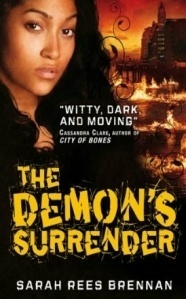 On Saturday, I read a book. I read, and read. I begged my daughter to let me read instead of being Mission Control to her game of Super Sisters, I did the occasional household chore and then ran back to my book straight after. I ate lunch while reading. I left my family to their own devices, went and lay on my bed and read until I was done.
On Saturday, I read a book. I read, and read. I begged my daughter to let me read instead of being Mission Control to her game of Super Sisters, I did the occasional household chore and then ran back to my book straight after. I ate lunch while reading. I left my family to their own devices, went and lay on my bed and read until I was done.
This, needless to say, is a rare event in our household. Once upon a time, reading all Saturday afternoon was a normal thing for me, but that was before I became a mother of two. My reading is usually snatched in ten minute intervals, between larger and more immediate demands on my time.
But this was The Demon's Surrender.
When my honey lifted an eyebrow at my complete immersion in the book, I said firmly, "I have been waiting for this book for FOURTEEN MONTHS" and he nodded gravely and left me to it. Wonderful man.
I review books all the time, and I was expecting to be able to review this one sensibly, but it turns out I have no ability to distance myself enough from my sheer crazy fan love of this series to be thoughtful and articulate. I'm more – "wheeee, all the right people in the tree, K – I – S – S – I – N -G!" because, baby, all my ships came home to roost, every single one of them.
Brennan has created a very fast-paced, entertaining series of YA urban fantasy with an elegantly simple magical system at its centre (you're either part of the Goblin Market, or you're a Magician, and by the way? Demons are scary), and a whole lot of horrible, angsty things happening to cute, witty people with knives. Like if Buffy was British, but better.
She has also done some extremely clever things, sneaked in amongst all the distracting banter and hot boys taking their shirts off. At first look, constructing a trilogy in which each volume has a different point of view character, sounds nuts. But in fact, it was the perfect choice for this story. With each point of view change, we get different ways of seeing the various characters, and the world looks slightly different. It's a way to delve into different corners of the story, quite intensely. The danger of course is that if you don't like one protagonist, you aren't likely to wait around for the next book to come out. There are plenty of readers who didn't engage with Nick, the teenage sociopath who narrated The Demon's Lexicon, and plenty more who objected to the shift of POV to Mae, a girl with pink hair who has kissed more than one boy, in The Demon's Covenant. There were even some who were concerned to hear that Sin, a minor character in both those books, was lined up to narrate Book Three.
Ahem. Some spoilers abound below. But I am quite restrained, honest.
Needless to say, I feel a little sorry for anyone who disliked any of Brennan's protagonists, because I love them all! I also enjoy the way that our opinion of the main cast shifts in the wind, depending on whose eyes we are seeing them through. Nick, for instance, shared with us that his brother Alan was the most important person in the world, and that newcomers Mae and Jamie are irritating, for the most part. He might fancy Mae, but won't do anything about it because Alan likes her and Alan deserves to be rewarded with the girl.
Mae, unlike Nick, appreciates that her own brother Jamie is hilarious, wonderful and entertaining. She likes Nick a lot more than Alan, especially as she comes to realise how untrustworthy Alan really is. The only thing she and Nick agree on, in their world view, is that Nick is devastatingly handsome.
Then there's Sin the dancer, who has not been part of the tight foursome who make up the first two parts of the story, and when she has turned up, has been painted as somewhere between a reluctant helper and an active antagonist. But Sin is wonderful.
Much as I came to like Mae far better in her own book than through Nick's eyes, I really loved Sin in her own book. I enjoyed the fact that she doesn't like or trust either Alan or Jamie, which made me feel like I came to know both of them far better than when their respective siblings were telling me how great they were. In fact, through Sin's eyes, I came to appreciate Alan as I never had before, so that the final act which has him in greater danger than any of them, meant more to me than if it were just Nick's brother and Mae's friend at stake.
My favourite thing, very favourite thing about this particular book, is the relationship between Mae and Sin. At the climax of the previous book, the two girls were pitted against each other, competing for something they both desperately wanted (not a boy). This is further compounded in this book in which they are both given a smaller quest to complete, to reach their mutual goal. Also, they both have complex and undefined relationships with the same two men. And yet, they respect each other, even when they are unhappy with each other's choices, and we never ever have the stupid moment where one of them is jealous of the other one's relationship with one of the boys. In fact, that moment is totally set up in the book in order to draw attention to it, and then THE STORY DOES NOT GO THERE.
In short, this is a YA series which not only respects female characters, but allows to reader to respect more than one of them at a time. It allows two girls to compete, without one of them being the bitch.
Sin is of mixed race – and I think it's great that this is reflected on my cover of the book, after all that CoverFail business! I'd be interested to hear what POC readers think of her portrayal, as she seemed quite sensitively handled to me and I liked very much that Brennan didn't shy away from the fact that Sin's colour would often affect the way she was seen by white people and the way she related to them, particularly with her situation as the carer for two young, white siblings. You can read Sarah Rees Brennan talking here about the importance of diversity in YA and why trying to do the right thing by Sin and her story was important to her.
I'm not sure if that article would make a lot of sense to people who haven't read the books but it was fascinating to me to read about how the main characters came to be, and how each of them represents a traditional character trope which has been turned on its head – particularly the effect of making the Desperate Nurturer character a boy, and the Wide-Eyed Adventurer a girl, not to mention showing us the inside of the head of Mr Tall, Dark and Dangerous, instead of holding him at arm's length.
The aspect I had been most worried about with this third book would be that it would be hard to get any satisfying resolution on the Nick-Mae relationship without one of them being the narrator – but, of course, I should have trusted Sarah and her army of eavesdropping protagonists. I closed the final book with a happy sigh, feeling that all was right with the world, and the last several years of hanging out for the first/next/last book in this trilogy had not been wasted.
Except, of course, she's writing a gothic series next with a family of evil hot blond aristocrats in it. So, of course… I CAN'T WAIT!
July 12, 2011
Galactic Suburbia Presents: Joanna Russ Spoilerific Book Club
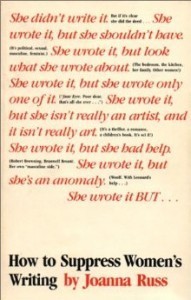 Our Joanna Russ special episode of Galactic Suburbia is up! Grab it from iTunes, by direct download or stream it on the site.
Our Joanna Russ special episode of Galactic Suburbia is up! Grab it from iTunes, by direct download or stream it on the site.
Featuring:
How To Suppress Women's Writing, by Joanna Russ
The Female Man, by Joanna Russ
"When it Changed," by Joanna Russ
Please send feedback to us at galacticsuburbia @ gmail.com – we'd love to hear your stories of discovering and rediscovering Joanna Russ.
Follow us on Twitter at @galacticsuburbs, check out Galactic Suburbia Podcast on Facebook and don't forget to leave a review on iTunes if you love us!
July 11, 2011
unexpected tuesday links!
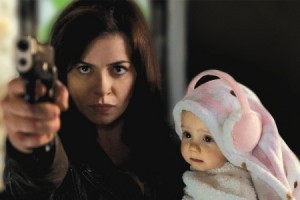 I skipped my Friday links post last week, because… well, you know. It was one of those days. I have so many links building up, though, I thought I'd better get one in now or I'll end up having to produce a whole magazine by the time Friday comes around again! Also, some of my links are in danger of looking severely dated…
I skipped my Friday links post last week, because… well, you know. It was one of those days. I have so many links building up, though, I thought I'd better get one in now or I'll end up having to produce a whole magazine by the time Friday comes around again! Also, some of my links are in danger of looking severely dated…
In other news, it is raining. Grim, vengeful rain. How else would you expect rain that holds off all day and then starts while I am EN ROUTE to pick up my daughter for school, with the baby in the back seat, so I don't even get a head's up that maybe today was not the day to put the baby in soft slippers? In other news, Jem has grown so much now that her feet entirely stick out of the stroller, and the plastic rain cover for said stroller. All of these facts are related.
Deb Biancotti is interviewed by Alisa at Galactic Chat!
Fabulous roundtable about (global) Women in World SF – every comment is packed with intelligent, thoughtful ideas. I am delighted such a thing exists in the world. Some important questions are asked, like – why is it so easy for urban fantasy to be excluded from any discussion on spec fic? And why is it that crime readers are so much more open to female authors than SF readers?
The roundtable was in response to this original post by Joyce Chng about women outside the English speaking world are doubly marginalised in the science fiction field.
Maureen Johnson takes on the writer of that Wall Street Journal article (podcast), on the topic of whether YA fiction is getting too dark for teenagers to be allowed to read – fabulous radio and it's cool to see how articulate Maureen is in person. It's irritating that the final word goes to a caller who is obviously just out to plug his own book and hasn't actually been listening to much that has been said in the conversation, and I was disappointed Maureen didn't get to comment on what he said, but for the most part I think her point of view came across clearly and the conversation was absolutely one worth having.
This post by Tricia Sullivan is getting a little long in the tooth now, but I think it's absolutely worth checking out if you haven't already. To put it and the conversation it responds to into context, it's also worth reading these two posts by Cheryl Morgan: Here We Go, and Further Thoughts. There is some intelligent, interesting conversation in the comments of all three of these posts.
I'm still chewing over my thoughts on the upcoming DC reboot, and this is one of the best posts I've seen exploring some of the problematic aspects of regressing storylines, particularly when it comes to female and minority characters.
There's also a Kickstarter project to raise money for Womanthology, a project involving veteran and newbie female comics creators.
There was a very silly article in the Guardian about how romance novels are bad for women and lead to sexual health problems. Smart Bitches, Trashy Books did a masterful takedown of the article, including the vital point that the books used for the survey referenced in the article are in fact very old and in no way representative of the current romance genre. Nicole Murphy also responded with something of a love letter to the romance genre.
Nicole also hosted a series of guest posts on the topic of Dreams and Fulfillment over the last week – you can find my contribution here.
Okay, does anyone else think this movie looks completely awesome? Steampunk Musketeers for the Win!
Pratchett's Women: The Boobs, the Bad and the Broomsticks
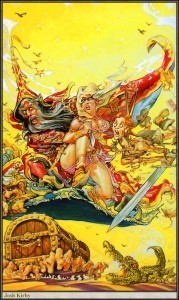 Some time ago, I talked on Galactic Suburbia about how I felt Pratchett was one of those writers who you can see noticeably improving and honing his craft as he goes, and that one of the elements he hugely improved in over the years was his treatment of female characters. Someone commented that they hoped we would elaborate on that at some point, and I have always intended to, though I don't know that Galactic Suburbia is the best place for that discussion – largely because I think I'm the only one of the three who is a huge reader of Pratchett.
Some time ago, I talked on Galactic Suburbia about how I felt Pratchett was one of those writers who you can see noticeably improving and honing his craft as he goes, and that one of the elements he hugely improved in over the years was his treatment of female characters. Someone commented that they hoped we would elaborate on that at some point, and I have always intended to, though I don't know that Galactic Suburbia is the best place for that discussion – largely because I think I'm the only one of the three who is a huge reader of Pratchett.
I started reading the Discworld books in the early 90′s, when Small Gods was the latest release. This meant that I read all the books before that in (mostly) the wrong order, and all of the books after that in (mostly) the right order. So it took me some time to figure out what was going on with Pratchett's women, and the chronology of those early books is still a little muddled in my head.
The first ten books of the Discworld series are quite problematic in their portrayal of female characters, particularly the younger women. I certainly don't think this was intentional on Pratchett's part, but an unfortunate result of the fact that in these early books he was largely writing parody of various fantasy worlds and tropes, just beginning to develop the Discworld into something more substantial and complex. I also feel that Pratchett was very much aware of some of the dreadful sexism in his source material, and the female characters he wrote were often in direct response to what he saw in the fantasy genre.
His intentions to point out the silliness of the portrayal of women in fantasy, sadly, backfired somewhat.
So in these early Discworld books, we find Pratchett parodying the half-clad, bosomy fantasy females who reward the handsome hero with their sexy selves by creating half-clad, bosomy fantasy females who a) say bitchy things to the (not handsome) hero in the hopes that no one would notice they still look like a complete cliche of the genre and/or b) amusingly fail to fall in love with the protagonist and instead choose to reward a less obvious male character with their sexy selves. We get Bethan, the glamorous priestess who is cross about being rescued from a temple but chooses to hook up with the aged Cohen the Barbarian instead of giving Rincewind a second look; we have Conina, the glamorous warrior woman who chooses to hook up with the nerdy whatsisname instead of giving Rincewind a second look; we have Ptraci, who is totally hot for Pteppic and vice versa, but when they discover they are siblings he literally hands her over to his mate; we have Princess Keli who goes for the dweeby wizard (finally a hot girl with a taste for wizards!) over the equally dweeby protagonist Mort; and of course we have Ginger and Ysabell, who are utterly bitchy to their respective guys, but ultimately sink into their arms.
[I should admit at this point that when I was fourteen and reading Pratchett for the first time, I adored Conina and Ptraci and Ginger and totally wanted to be just like them when I grow up. I look back on that now and shudder, just a bit. Among the many other things I would like to tell my teenage self, 'how about we aspire to be something other than a Josh Kirby cartoon character' would be pretty bloody high on the list.]
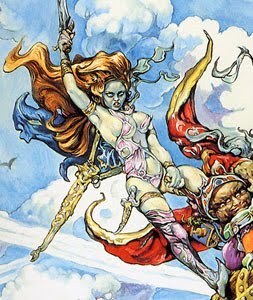 Pratchett has a lovely paragraph in The Light Fantastic (1986) in which he describes Herrena the Henna-Haired Harridan, a barbarian warrior, and goes on at length about how in other fantasy worlds she would be dressed in a lurid but impractical costume, but in fact she was wearing some quite sensible armour. Have a cold shower, chaps, the woman is appropriately attired. This elegant and witty paragraph was completely sabotaged by the fact that the cover art, as with all Discworld covers painted by Josh Kirby, depicted Herrena bursting out of a tiny slutty outfit with enormous beach ball bosoms. And that sadly is what I see now when I look back on my favourite Pratchett heroines of my teen years – good intentions which simply didn't go far enough. The girls got to look pretty and make the occasional sarky comment, but they didn't get personalities that ran deeper than their bra size. (also, it has to be said, they all pretty much had the SAME personality)
Pratchett has a lovely paragraph in The Light Fantastic (1986) in which he describes Herrena the Henna-Haired Harridan, a barbarian warrior, and goes on at length about how in other fantasy worlds she would be dressed in a lurid but impractical costume, but in fact she was wearing some quite sensible armour. Have a cold shower, chaps, the woman is appropriately attired. This elegant and witty paragraph was completely sabotaged by the fact that the cover art, as with all Discworld covers painted by Josh Kirby, depicted Herrena bursting out of a tiny slutty outfit with enormous beach ball bosoms. And that sadly is what I see now when I look back on my favourite Pratchett heroines of my teen years – good intentions which simply didn't go far enough. The girls got to look pretty and make the occasional sarky comment, but they didn't get personalities that ran deeper than their bra size. (also, it has to be said, they all pretty much had the SAME personality)
There were some exceptions. Lady Sybil, in Guards Guards (1989), is an unusual romantic interest in that she has a fully defined personality, gets lots of witty lines that aren't particularly bitchy, and is actually an equal match for the protagonist, Commander Vimes. She's also a mature age woman who is not lithe and pretty, and thus escapes much of the usual 'I am standing here in my fur bikini being ironic about the sexist portrayal of women' depictions of Discworld women. She was developed more substantially later on, but this was a good start.
Then there were the witches. After two books which featured the same hapless wizard running away from trouble and occasionally colliding with astoundingly sexy women who don't want to sleep with him, Pratchett turned his attention to feminist issues with Equal Rites (1987), a book which tackled one of the most problematic tenets he had saddled his world with: that magic was divided by gender, men becoming wizards and women witches, both types of magic being almost entirely different from each other. In Equal Rites, a girl is born with the magic and destiny of a wizard, and with the help of her mentor witch Granny Weatherwax, has to fight the system to be allowed into the Unseen University.
I hated this book.
Which is bizarre, because it sounds exactly like my sort of thing, right? But I think we've already established that teenage reading me is not ME. The problem was that I was reading my way through the backlist of Discworld books in the wrong order, and having read the blurbs, I had completely fallen in love with the concept of that one. So I saved it for last. By the time I got to it, my expectations were through the roof, and I resented utterly the book that it wasn't: it was about a child, not a teenage girl or adult woman (yep the fact that it wasn't Conina-Ptraci-Ginger in a wizard's hat seemed like a flaw), and while the best thing about the book was indeed Granny Weatherwax, I had already read her being far more awesome elsewhere, and she seemed a pale shade of herself without Nanny Ogg or Magrat to grate against. I later revisited Equal Rites more than once, and came to terms with it, though I never really learned to love it. Still, the fact that it remains the least interesting book about witches is hardly relevant now. Given that it's 3rd in a series of nearly 40 books, that's good news.
Despite my lack of love for Equal Rites, over the years I was disappointed that while the Discworld was legendary for cameo appearances and continuing characters, we never returned to Esk's story. No matter how many times we returned to the Unseen University, she wasn't there. We never saw how she turned out, and never got to see her as an adult. Until, of course, the most recent Tiffany Aching book, I Shall Wear Midnight (2010), which also features cameos from Nanny Ogg and Magrat. I Shall Wear Midnight felt very much like a satisfying line was being drawn under the saga of the Lancre witches, and having that unexpectedly delightful resolution about Esk made me want to go back and revisit the other witches stories, from the beginning.
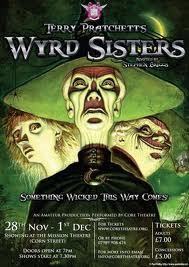 So, thanks to the wonder of unabridged audiobooks, I reintroduced myself to Wyrd Sisters (1988), and immersed myself utterly in what is still, I believe, one of Pratchett's most effective literary works. You can praise Reaper Man and Small Gods all you like; I'll take a Witches book over those two 'classics' every time. For the first time, Pratchett stopped satirising fantasy and started looking further afield for material to poke sticks at. And he decided Shakespeare would be his first port of call! This glorious work amalgamates the best and worst aspects of Hamlet and Macbeth, produces one of my favourite fictional double acts of all time (Granny Weatherwax and Nanny Ogg) and for the first time, created a young female character (Magrat) with the same ruthless complexity as Rincewind or Mort. Magrat isn't a sexy treasure with which to reward the hero (or amusingly reward someone else). She's a real person, warts and all, and her voice is every bit as compelling and sympathetic as it is, you know, a bit nasal and annoying.
So, thanks to the wonder of unabridged audiobooks, I reintroduced myself to Wyrd Sisters (1988), and immersed myself utterly in what is still, I believe, one of Pratchett's most effective literary works. You can praise Reaper Man and Small Gods all you like; I'll take a Witches book over those two 'classics' every time. For the first time, Pratchett stopped satirising fantasy and started looking further afield for material to poke sticks at. And he decided Shakespeare would be his first port of call! This glorious work amalgamates the best and worst aspects of Hamlet and Macbeth, produces one of my favourite fictional double acts of all time (Granny Weatherwax and Nanny Ogg) and for the first time, created a young female character (Magrat) with the same ruthless complexity as Rincewind or Mort. Magrat isn't a sexy treasure with which to reward the hero (or amusingly reward someone else). She's a real person, warts and all, and her voice is every bit as compelling and sympathetic as it is, you know, a bit nasal and annoying.
The three witches – maiden, mother and crone (you should hear them argue about which is which) are a masterful creation, and it doesn't matter what the plot is, an excuse to see them riff off each other, snark at the universe and save it at the last minute, since they have nothing else on, is a genuine pleasure. The surprise in coming back to Wyrd Sisters is just how good the plot is – how cleverly the Shakespearian elements weave together, into an elaborate comedy of errors. Indeed, all of the witch plots tend to be about stories, and about the way stories work in a world of magic, and that meta-element raises them into being far more than just amusing romps with complicated sentences (which I think is a fair description of all the Discworld books before this one, yes, even Mort).
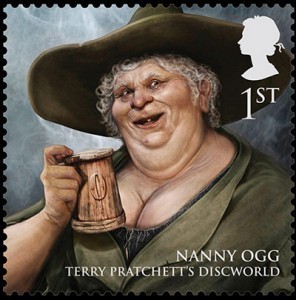 Think about it. These are stories about witches that know fairy tales exist; witches who know about the dangers of cackling too much and getting a reputation for gingerbread houses. Wyrd Sisters is about what happens when the legends and stories about witches are used against them as a weapon; and how they fight back. It was fascinating to read it so soon after I Shall Wear Midnight, because there are huge parallels between the plots of the two books, another reason why I think Pratchett has now written his last witch book. It's pretty clear from his more recent public appearances and his illness that he's planning how things are going to end, and for a writer that means more than saying your farewells to family and friends. He's tying up the loose ends of his legacy, and it feels very much as if the story of the Discworld witches is done.
Think about it. These are stories about witches that know fairy tales exist; witches who know about the dangers of cackling too much and getting a reputation for gingerbread houses. Wyrd Sisters is about what happens when the legends and stories about witches are used against them as a weapon; and how they fight back. It was fascinating to read it so soon after I Shall Wear Midnight, because there are huge parallels between the plots of the two books, another reason why I think Pratchett has now written his last witch book. It's pretty clear from his more recent public appearances and his illness that he's planning how things are going to end, and for a writer that means more than saying your farewells to family and friends. He's tying up the loose ends of his legacy, and it feels very much as if the story of the Discworld witches is done.
But back to Wyrd Sisters, the beginning of it all! The female characters are absolutely in command here, on both sides of the story – the Duchess is a magnificently awful villain, one in a long line of marvellous female antagonists set against Granny Weatherwax, and she quite overshadows her husband, as is appropriate considering the parallels to Macbeth and Lady Macbeth. I also want to mention that there are also some fantastic male characters. Pratchett writes great beta males, the most obvious early examples being Rincewind, Mort and Vimes, but I was surprised all over again in this reread just how extraordinary is the character of the Fool. Everyone else is taking part in a comedy, up to and including the ghost of the dead king, but the Fool walks in a tragedy, carrying an abusive past and a more recent painful burden along with his unwavering, committed loyalty to Duke Felmet, the villain of the piece. Even when he's being funny – and he is very funny – he's utterly miserable. The romance between Magrat and the Fool, with its many wrong turns and awkward silences, is one of the most egalitarian and sincere I have come across in fantasy fiction, and I loved discovering it all over again. On the other side of the scale, Tomjon is a marvellous creation, and I like what Pratchett says about destiny and kings through his character – for all this story is mostly about Shakespeare's stories, it also nicely undercuts some of the sillier notions of fantasy fiction, notably the legend of the lost king, something later also done to great effect in the guards books. The relationship between Tomjon and his sidekick the playwriting dwarf Hwel is a pleasure to read.
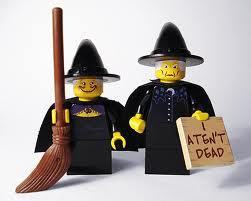 But of course ultimately, the best thing about this book is that triad of Granny Weatherwax, Nanny Ogg and Magrat Garlick, each of them such vibrant characters that everyone else is in the shade. The scene in which the three of them perform a huge feat of magic, recharging broomsticks and flying around the kingdom to transport it in time, is epic and breathtaking – though any scene with the three of them in it makes me happy, even if it's them talking about cups of tea and what kind of sandwiches they like best.
But of course ultimately, the best thing about this book is that triad of Granny Weatherwax, Nanny Ogg and Magrat Garlick, each of them such vibrant characters that everyone else is in the shade. The scene in which the three of them perform a huge feat of magic, recharging broomsticks and flying around the kingdom to transport it in time, is epic and breathtaking – though any scene with the three of them in it makes me happy, even if it's them talking about cups of tea and what kind of sandwiches they like best.
Once I had finished the 8 hours or so of listening to Wyrd Sisters, I moved straight on to Witches Abroad (1991), which has always been one of my favourites: this is the one which most effectively deals with the role of the witch in stories and fairytales, and is also pure Ogg-Weatherwax-Magrat hilarity from beginning to end.
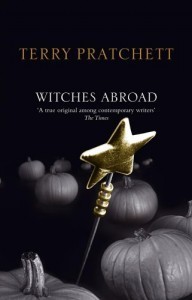 But only when listening to Nigel Planer read it to me over the last few weeks did I realise something I had never entirely noticed before: this is a fantasy novel in which all the important characters are women. This is a fantasy novel by a bestselling male author in which all the important characters are women. We have the trio of Granny Weatherwax, Nanny Ogg and Magrat, travelling to foreign parts. We have the witches/cooks of Genua: Lilith, Mrs Pleasant, and Mrs Gogol. We have Emberella, the hub around which the story is constructed. But the only male characters of any note are a) a frog turned into a prince who rarely speaks and is basically a Maguffin, b) a cat turned human who has no agency and no personal needs beyond a bowl of fish-heads, c) a zombie and d) a dwarf one-note-joke about Casanova, who arrives in the final act and provides some extra comic relief. (admittedly he becomes a far more important character in later books, but really if it wasn't for that I'd barely have mentioned him at all)
But only when listening to Nigel Planer read it to me over the last few weeks did I realise something I had never entirely noticed before: this is a fantasy novel in which all the important characters are women. This is a fantasy novel by a bestselling male author in which all the important characters are women. We have the trio of Granny Weatherwax, Nanny Ogg and Magrat, travelling to foreign parts. We have the witches/cooks of Genua: Lilith, Mrs Pleasant, and Mrs Gogol. We have Emberella, the hub around which the story is constructed. But the only male characters of any note are a) a frog turned into a prince who rarely speaks and is basically a Maguffin, b) a cat turned human who has no agency and no personal needs beyond a bowl of fish-heads, c) a zombie and d) a dwarf one-note-joke about Casanova, who arrives in the final act and provides some extra comic relief. (admittedly he becomes a far more important character in later books, but really if it wasn't for that I'd barely have mentioned him at all)
How rare is it to have a fantasy novel BY A MAN which is entirely about female characters? How rare to have a story with so many women in it that you don't even need a romance because the women already have plenty to do? In the fantasy genre. This is completely doing my head in, because this is a book that has existed for twenty years, which I have loved for almost that amount of time, and this particular quite important facet of it is something I never entirely realised before.
So yes. Despite the glamour girls and snarky wenches which mostly populated the first decade of Discworld, the witch books redeem this period for me: books which not only feature female protagonists who are allowed to be as three dimensional, complicated, flawed and fascinating as Pratchett's best male protagonists, but are allowed to be more powerful and important than the men in their stories.
But that's not the good news. The good news is that after this, Pratchett only got better at writing women – and in particular, at writing young women who had a soul as well as (or even instead of) a great rack. There was Angua, Cheery, Agnes/Perdita and, most recently, there was Tiffany Aching, possibly the most convincing and interesting teenage girl written by a 50+ man. And of course, much later, there was another book that featured all female protagonists… but I'll talk about that when I get to it.
July 8, 2011
Uncommon Criminals, by Ally Carter
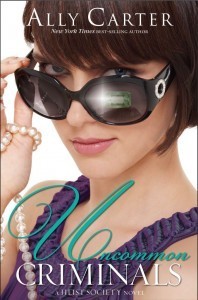 There are two very important points about heist stories which are reiterated throughout this second volume of the 'Heist Society' series. Firstly, heist stories are about family, usually the kind of family which is assembled from a group of misfits rather than actual blood relatives. This allows them to be stories about love and trust, even as the protagonists themselves are deeply untrustworthy. Secondly, heist stories are usually all about the boys.
There are two very important points about heist stories which are reiterated throughout this second volume of the 'Heist Society' series. Firstly, heist stories are about family, usually the kind of family which is assembled from a group of misfits rather than actual blood relatives. This allows them to be stories about love and trust, even as the protagonists themselves are deeply untrustworthy. Secondly, heist stories are usually all about the boys.
What I really like about Carter's books, apart from her being the author of some of the best fun, escapist (and yet smart) YA stories since Meg Cabot's Princess Diaries, is that she takes stories that are normally all about men, and gives them to girls instead. The Gallagher Girls took the world of James Bond, the Bourne Identity, etc. and asked the question, where would those spies send their daughters to school? The Heist Society series likewise asks about the youngest generation of a traditionally male occupation, but this time it's the con men, jewel thieves and catburglars whose kids are having their own adventures.
From The Italian Job to Ocean's Eleven, and even TV series Hustle, heist stories generally are about a team of guys, with maybe one token woman (who is hot). Ally Carter's Heist Society isn't quite as girl-centric a story as the Gallagher Girls, but she has a great, complex heroine as her protagonist, and deals very well with the moral ambiguities of the criminal life, as well as indulging in the very appealing idea of your family and your team being stronger than the sum of its parts.
I very much liked the antagonist set up in this story, a woman of a different generation who knows all of Kat's family secrets and all the cons in the book – and the way that she and Kat used each other's assumptions and preconceptions against each other. It's a very entertaining dance, and one tinged with potential heartbreak every step of the way, as Kat moves out from the shadow of her family, determined to bring down this ghost from her uncles' past.
Also, this one is about emeralds. Got to love a pair of sparkly, incredibly valuable, possibly cursed emeralds.
There was frustratingly little progress in the main romance of this series – though I was intrigued to see Carter bring back the elements of what looked like yet another love triangle, only to throw her hands up and pretty much admit that there's only one horse in this race. Which is absolutely true, and JUST FINE thank you, and could they please get on with it? Sigh. One of these days I will actually wait until a series is finished before I start reading it…
No, I won't.
The only trouble with all of Ally Carter's books is after waiting ages for the latest volume to be released, I read them so fast that they barely touch the sides. Still, it's lovely to have some books for teenage girls which are fluffy, witty and action-packed, without in any way being about princesses.
July 1, 2011
The Social Habits of Forsytes
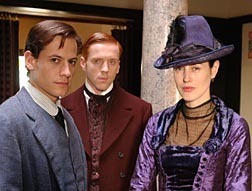 Thrown into a tizzy at the lack of new Downton Abbey in my life, I fell back on one of my favourite costume drama stories of all time, by listening to the audio dramatisation of The Forsyte Saga. The down side of Audible is that there is often little/misleading information on the as to the source of the material – I guessed this was a radio production, and also that it wasn't produced at ALL in 2010 as the copyright info suggested, thanks to the presence of Sir Michael Hordern (died fifteen years ago), Dirk Bogarde (died ten years ago) and an unrecognisably young Amanda Redman as Fleur. I eventually pinned it down as this 1990 production, which at the time was the most expensive radio series ever made. My favourite bit of the article is where Dirk Bogarde came in thinking his role as Galsworthy (the author and narrator) would just involve a bit of "topping and tailing" but it turned out to be a major performance. He is lovely in it. I adore Galsworthy's prose, which I think is third only to Austen's and Pratchett's for sophisticated, dry observational humour, and it was nice that despite it being a dramatisation, an awful lot of the original text appeared.
Thrown into a tizzy at the lack of new Downton Abbey in my life, I fell back on one of my favourite costume drama stories of all time, by listening to the audio dramatisation of The Forsyte Saga. The down side of Audible is that there is often little/misleading information on the as to the source of the material – I guessed this was a radio production, and also that it wasn't produced at ALL in 2010 as the copyright info suggested, thanks to the presence of Sir Michael Hordern (died fifteen years ago), Dirk Bogarde (died ten years ago) and an unrecognisably young Amanda Redman as Fleur. I eventually pinned it down as this 1990 production, which at the time was the most expensive radio series ever made. My favourite bit of the article is where Dirk Bogarde came in thinking his role as Galsworthy (the author and narrator) would just involve a bit of "topping and tailing" but it turned out to be a major performance. He is lovely in it. I adore Galsworthy's prose, which I think is third only to Austen's and Pratchett's for sophisticated, dry observational humour, and it was nice that despite it being a dramatisation, an awful lot of the original text appeared.
As a side note, why is it with so many major radio dramatisations of big classic books and serials such as this, there are so few of fantasy novels? I know there's a well-regarded audio dramatisation of Lord of the Rings, but surely the serial and substantial nature of epic fantasy, as well as the incredible popularity of some series and authors, PLUS the crazy expense of adapting them to visual media like film or TV, would make them ideal for audio? I find it interesting that there's such a strong history of science fiction in radio/audio plays, from Hitchhiker's Guide and Earthsearch all the way through to today's Big Finish. I first encountered Asimov's Foundation through a radio play… so where are the radio dramatisations of Pratchett and Gaiman and David Eddings and Mercedes Lackey and… okay, let's scrub the Americans as they don't have the cultural history of modern radio drama like the Brits, but where is the 24 part radio serial of Jonathan Strange & Mr Norrell, or Lord Dunsany or HARRY POTTER?
Ahem, anyway.
 I love the Forsyte Saga. Like, crazy, adoring love. I first discovered it through the 2002 TV adaptation with Damien Lewis and Rupert Graves, then read the books at least twice through, then got hold of the epic black and white "TV event" version from the 60′s, thanks to my university library. Finding another fully dramatised version was a delight, especially as it turned out to be a very good one. Old Jolyon was played by Sir Michael Hordern, an actor I came to through many classic British movies, notably A Funny Thing Happened On The Way To The Forum. Young Jolyon, who is my favourite and my best, was played by Anton Lesser, who also won my heart as Falco in the audio dramatisations of Lindsey Davis' novels. Diana Quick is a gentle and affecting Irene, Alan Howard is a suitably creepy and horrifically compelling Soames, and when she finally turns up, Amanda Redman captures the caprice of Fleur with that perfect balance of adorable and oh-I-want-to-slap-her.
I love the Forsyte Saga. Like, crazy, adoring love. I first discovered it through the 2002 TV adaptation with Damien Lewis and Rupert Graves, then read the books at least twice through, then got hold of the epic black and white "TV event" version from the 60′s, thanks to my university library. Finding another fully dramatised version was a delight, especially as it turned out to be a very good one. Old Jolyon was played by Sir Michael Hordern, an actor I came to through many classic British movies, notably A Funny Thing Happened On The Way To The Forum. Young Jolyon, who is my favourite and my best, was played by Anton Lesser, who also won my heart as Falco in the audio dramatisations of Lindsey Davis' novels. Diana Quick is a gentle and affecting Irene, Alan Howard is a suitably creepy and horrifically compelling Soames, and when she finally turns up, Amanda Redman captures the caprice of Fleur with that perfect balance of adorable and oh-I-want-to-slap-her.
Listening to the story all over again, I was struck with how feminist these novels are, considering they were written in the very early twentieth century, and large tracts of them do consist of old men talking to each other. Galsworthy is a sly dog, and while this looks on the surface like a starchy Victorian family saga, it is also a deeply subversive story about class, society and yes, feminist ideas, tangled up with comic observation and sharp emotional tragedy. It is the story with EVERYTHING.
 I'm going to talk about the main trilogy, A Man of Property, In Chancery and To Let, because they are perfect and the story which came after them (in another six volumes) was diluted somewhat, once so many of its most compelling players had left the stage. There are strong themes running through these original three books, and the one they all have in common is the way that property and financial laws are so constraining (often in devastating ways) on society and people trying to live their lives. In particular, they are about love and marriage as commodities. The Forsyte family are a caricature and a metaphor for the business-minded upper middle class in Victorian society, the lawyers and bankers and landowners… those who would have been utterly looked down upon by, say, the inhabitants of Downton Abbey or Eaton Place.
I'm going to talk about the main trilogy, A Man of Property, In Chancery and To Let, because they are perfect and the story which came after them (in another six volumes) was diluted somewhat, once so many of its most compelling players had left the stage. There are strong themes running through these original three books, and the one they all have in common is the way that property and financial laws are so constraining (often in devastating ways) on society and people trying to live their lives. In particular, they are about love and marriage as commodities. The Forsyte family are a caricature and a metaphor for the business-minded upper middle class in Victorian society, the lawyers and bankers and landowners… those who would have been utterly looked down upon by, say, the inhabitants of Downton Abbey or Eaton Place.
Among other things, the books criticise and condemn marital rape, the weak position of women in the marriage laws of the time, the very destructive idea that you can/could possess another human being (even if you love them), and how gossip and scandal can actively work against people's happiness (even though it's kind of fun to indulge in it). Galsworthy is also nicely cynical about how eternal young or first love actually is anyway, how anyone can actually know whether their marriage will work or not before they have had sex with each other. He also has very strong opinions about how it's really not a good idea to put anyone in the position of having to choose romantic love over family, or family over romantic love.
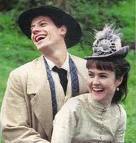 Did I mention the novels are funny? Packed with angst, and funny. The perfect storm of effective drama, as far as I'm concerned.
Did I mention the novels are funny? Packed with angst, and funny. The perfect storm of effective drama, as far as I'm concerned.
While the male protection of Irene and her exceptional beauty might seem quite anti-feminist as narratives go, it is important to note that it is constantly challenged and discussed in the novel, so that men's reaction to her is shown to be all about them rather than about her, and her need for protection is regularly highlighted as being a fault of society. The lack of narrative victim-blaming is rather extraordinary. I was also fascinated with how Galsworthy negotiated the romance between Jolyon and Irene, which is rendered so difficult by his determination not to make her feel beholden to him, as well as her own emotional scars. She needs protection, and he admires her beauty (as an artist), and both of them are very aware that it's exactly these things which made her marriage to Soames so appalling. It's a remarkably feminist romance as well as a mature one, and far more satisfying to me than any other in the book, whether it be the firefly passion of Irene and Bosinney, the sweet and innocent Val and Holly, or the star cross'd brats Fleur and Jon.
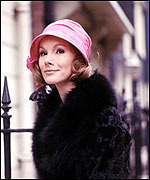 As well as a variety of interesting male characters, ranging from the upright and traditional Victorian gentlemen through several bohemian and progressive types, and a variety of earnest youngsters who grow up to be almost respectable, Galsworthy provides a huge range of complex, interesting women. The family saga format, covering many years and several generations, allows for us to see how characters develop in that time, how they change and how they do not. We first see June Forsyte as a young and rather silly girl whose habit of adopting "lame ducks" leads her to fall in love with Bosinney and get her heart broken, and while she never marries (a detail which has rankled with me just a smidge) she throws herself into life with great gusto as an adult woman, reinventing herself as a wartime nurse, a patron of the arts and a rather wicked, enabling auntie. Likewise Irene's journey away from her confining marriage, through exile and independence, into a completely different kind of marriage in her later years, and finally a devoted (if smothering) motherhood, shows different sides of her character as she ages, and it is quite galling to see how, even after years or decades free from Soames' ownership, she can still be threatened by his very presence, a happy and satisfied woman freezing with horror at the return of an old nightmare. I also have soft spots for the Aunts, though they are all quite horrible, with poor old Winifred, and with the portrayal of Annette, whom we see first as an innocent French girl Soames selects as a suitably doting second wife, and then later see blossomed into a confident but brittle lady of the manor, refusing to let him squash her despite his best efforts. I have to admit I rather loathe Fleur herself, which may explain why I can't love the later novels quite so much, but much like Soames himself, I admire the portrait Galsworthy has portrayed of that particular kind of feminine selfishness, a girl so utterly spoilt that she would happily sacrifice anything and hurt anyone as long as she can have that thing (or person) she has only just decided she wants for herself.
As well as a variety of interesting male characters, ranging from the upright and traditional Victorian gentlemen through several bohemian and progressive types, and a variety of earnest youngsters who grow up to be almost respectable, Galsworthy provides a huge range of complex, interesting women. The family saga format, covering many years and several generations, allows for us to see how characters develop in that time, how they change and how they do not. We first see June Forsyte as a young and rather silly girl whose habit of adopting "lame ducks" leads her to fall in love with Bosinney and get her heart broken, and while she never marries (a detail which has rankled with me just a smidge) she throws herself into life with great gusto as an adult woman, reinventing herself as a wartime nurse, a patron of the arts and a rather wicked, enabling auntie. Likewise Irene's journey away from her confining marriage, through exile and independence, into a completely different kind of marriage in her later years, and finally a devoted (if smothering) motherhood, shows different sides of her character as she ages, and it is quite galling to see how, even after years or decades free from Soames' ownership, she can still be threatened by his very presence, a happy and satisfied woman freezing with horror at the return of an old nightmare. I also have soft spots for the Aunts, though they are all quite horrible, with poor old Winifred, and with the portrayal of Annette, whom we see first as an innocent French girl Soames selects as a suitably doting second wife, and then later see blossomed into a confident but brittle lady of the manor, refusing to let him squash her despite his best efforts. I have to admit I rather loathe Fleur herself, which may explain why I can't love the later novels quite so much, but much like Soames himself, I admire the portrait Galsworthy has portrayed of that particular kind of feminine selfishness, a girl so utterly spoilt that she would happily sacrifice anything and hurt anyone as long as she can have that thing (or person) she has only just decided she wants for herself.
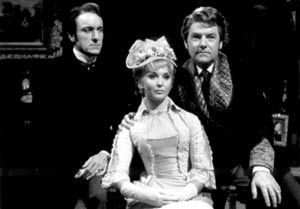 As I listened to the story unfold, again, marvelling especially at the layers of story and family tangles, at the dripfeed of backstory and scene setting, at the dialogue and of course the sweet, sweet angst, I thought a lot about fantasy fiction. In particular, how the family saga is so beautifully compatible with fantasy fiction, and how much I want to write a story like that. The first fantasy series which won my heart were The Belgariad and Mallorean, which is very much a generational family story, especially with the prequels about Belgarath and Polgara. The fantasy series which finally pushed me over the edge to write for myself was Jennifer Roberson's Cheysuli Chronicles, which uses the family saga format brilliantly over about five generations, and depicts the social change of a magical race from exiles whose very existence makes the humans shudder, to the rulers of the land, and finally to a union through marriage with their greatest enemies.
As I listened to the story unfold, again, marvelling especially at the layers of story and family tangles, at the dripfeed of backstory and scene setting, at the dialogue and of course the sweet, sweet angst, I thought a lot about fantasy fiction. In particular, how the family saga is so beautifully compatible with fantasy fiction, and how much I want to write a story like that. The first fantasy series which won my heart were The Belgariad and Mallorean, which is very much a generational family story, especially with the prequels about Belgarath and Polgara. The fantasy series which finally pushed me over the edge to write for myself was Jennifer Roberson's Cheysuli Chronicles, which uses the family saga format brilliantly over about five generations, and depicts the social change of a magical race from exiles whose very existence makes the humans shudder, to the rulers of the land, and finally to a union through marriage with their greatest enemies.
It's also what I love most about the work of Rowena Cory Daniells – her original Last T'En series was all about family and love and the political function of marriage and inter-breeding to cement an invasion. Her King Rolen's Kin series is about a single generation but ties back to the stories and traditions of the previous and the next, and I look forward to seeing how the second trilogy in that world moves it all forward. I'm excited beyond words about the First T'En series finally heading for publication, as I've read and enjoyed it in manuscript form (several different manuscript forms!) over several years, and it's my favourite example of that combination of family saga and fantasy, because of the way the two feed into each other. Once you add magical blood to the list of things that have to be taken into account with relationships, sex and familial ties, the potential for angst is EXTREME.
All of which is a very long way of getting around to saying that I know exactly what I will be writing after I have set Nancy Napoleon down. My brain was firing towards starting a family saga from scratch, but in fact the next fantasy book that was on my To Write shelf anyway is in fact about family drama and history and generational issues… I'd just been so wrapped up in the central conceit of it that I had lost track of that essential detail. But now I'm ridiculously excited about it. Sooooon!
June 30, 2011
Friday Cup of Linkage
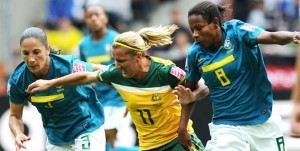 For those looking for a World Cup update from me, all I can say is it is no shame at all for the Matildas to have lost to Brazil, because come on, it's freaking Brazil, they were up against Cristiane and Marta, so I'm really not being an Australian apologist to say that it's impressive the gap between scores wasn't much wider. (here's a summary of the match from the Boston Globe)
For those looking for a World Cup update from me, all I can say is it is no shame at all for the Matildas to have lost to Brazil, because come on, it's freaking Brazil, they were up against Cristiane and Marta, so I'm really not being an Australian apologist to say that it's impressive the gap between scores wasn't much wider. (here's a summary of the match from the Boston Globe)
Meanwhile, thanks to a combination of the 'women's football' RSS feed from the Guardian and the presence of at least 4 Arsenal players, I've been paying a lot more attention to the England team, which is amusing to me because when the England men's team plays anything I normally spend most of my time muttering at them with very narrowed eyes. I kind of love the video diaries the team have been releasing, if only to listen to their cute accents, though sadly they didn't win their match either. (1-1)
Moving aside from sport now, here's an extra plug for Marianne de Pierres' new project, cowpunk webcomic Peacemaker. Check out the first issue now for a measly 99¢ – much though I disapprove of people pricing whole novels at 99¢, I think it's exciting for shorter pieces, and as an Australian it's rather nice to actually get the 99¢ price for once (yes, iTunes with your $1.19, I'm looking at you, you know what the Australian dollar is actually worth, right?). I believe later issues will be priced higher, so now's your chance to find out if you like Peacemaker!
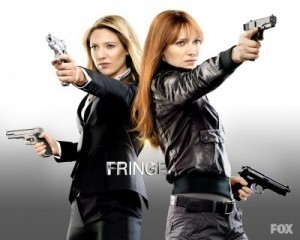 Speaking of awesome Australian women (and fictional heroes) here's a great interview with Anna Torv from Fringe.
Speaking of awesome Australian women (and fictional heroes) here's a great interview with Anna Torv from Fringe.
I have been so impressed with Torv's performance throughout the third season of Fringe, playing two versions of the same character, and managing to make both utterly compelling rather than falling into the Spock's beard style of parallel world characterisation. Speaking of Spock's beard, the episode which required Torv to channel Leonard Nimoy for a whole episode was amazing. Kudos to the show for the subtle and powerful writing, too. Having loved Fringe in spite of itself in season one, and gone through such excitement when season two was so very good from beginning to end, I'm somewhat beside myself that Fringe is now some of the most exciting and interesting SF TV in years, and mark it as a coup that my honey now watches it with me. It's gone from a show I considered a guilty pleasure to one that so many of my friends respect, like and get excited by. So hooray for the excellent cast, whoa for the spectacular final episode, and woohoo for season 4 on the horizon. I'm glad to hear that Torv's performance is being heralded (finally!) but I really really hope John Noble gets the Emmy or the GG – his Walter Bishop has always been exceptional to watch, and it feels like every time the rest of the cast rise to his challenge, he just gets better.
Some shorter links now, I promise!
Forbidden Planet asks, Are you a misogynist?
Kate Beaton makes a very good (and hilarious) point about 'strong female characters' through comic art.
Ben Peek writes about the small world view of speculative fiction in the 21st century.
From Meanland, the death of the book and other utopian fantasies (via @vodkanlime)
Two from Tor.com re-reading Joanna Russ (in order) starting with The Adventures of Alyx and Greg van Eekhout & Carrie Vaughn talk about YA, middle grade fiction and how The Kids Are All Right.
And in closing, Pixar finally have a female protagonist. The film looks awesome and I love the title so very much.
Clarion Write-A-Thon Week Two
It's embarrassing how easily the writing routine has settled comfortably into my brain, and my life. I could have been recovering my discipline months ago. Already my 20,000 manuscript has leapt ahead to be a 30,000 word manuscript and I am very confident that it will, by the end of this six week challenge, be a 50,000 word manuscript.
Not only has the writing been going really well, but the synapses have been firing, and I'm starting to gear up for the book I'm going to start writing in November, once Nancy is done and dusted. How awesome is that?
====
If you would like to encourage me over the next six weeks as I retrain myself as a writer and write 30K of my new novel, you can sponsor me at the Clarion Write-a-Thon. No amount too small, all funds raised go towards supporting the Clarion writer's workshop. I also accept encouraging comments, attagirls and anecdotes about your own times of writerfail and writerwin.
June 29, 2011
Legendary Cover
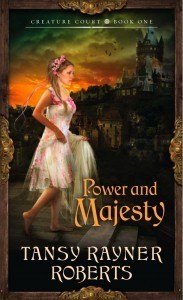 The trouble with podcasting with Galactic Suburbia once a fortnight is that I tend to wipe my brain clear after every episode, which might explain (somewhat) why I totally failed to congratulate Olof Erla Einarsdottir here on the blog for winning the David Gemmell Ravenheart Award for the cover of Power and Majesty. Hooray! It's very exciting to have a book only available in Australia and New Zealand take out an international fan-voted award, and lovely that so many people agree with me that it's a rather gorgeous cover.
The trouble with podcasting with Galactic Suburbia once a fortnight is that I tend to wipe my brain clear after every episode, which might explain (somewhat) why I totally failed to congratulate Olof Erla Einarsdottir here on the blog for winning the David Gemmell Ravenheart Award for the cover of Power and Majesty. Hooray! It's very exciting to have a book only available in Australia and New Zealand take out an international fan-voted award, and lovely that so many people agree with me that it's a rather gorgeous cover.
I only met David Gemmell once, at PhanCon where it was announced that my first novel Splashdance Silver had won the George Turner Prize. He was a marvellous, funny and warm public speaker, and had the privilege of sitting close enough at dinner to hear he and Terry Pratchett arguing amiably with each other over whether there was any reason to divide a book into chapters, and whether chocolate or fruit based desserts were preferable.
I've been really pleased with Olof Erla's work on all three covers for The Creature Court trilogy – can't wait to share the third with you all. Anyone want to guess who is featured on the cover of 'Reign of Beasts' and what colour frock they might be wearing?

